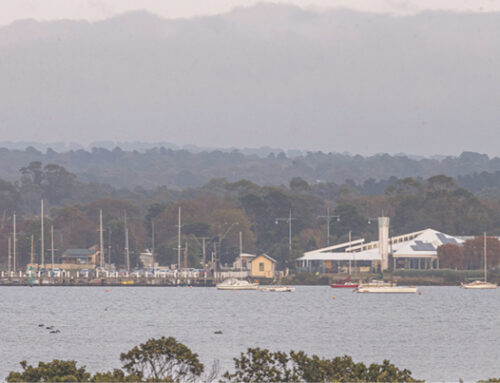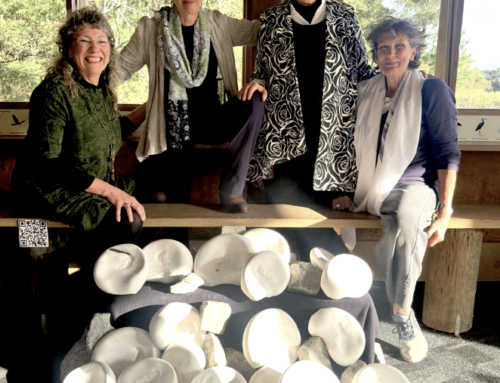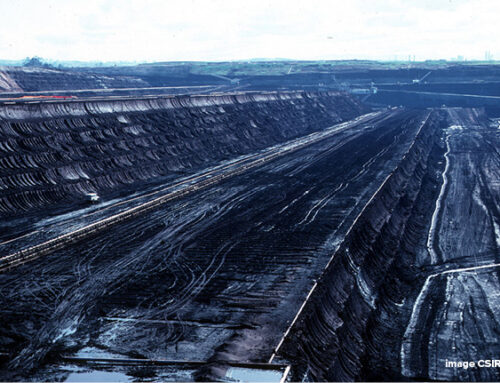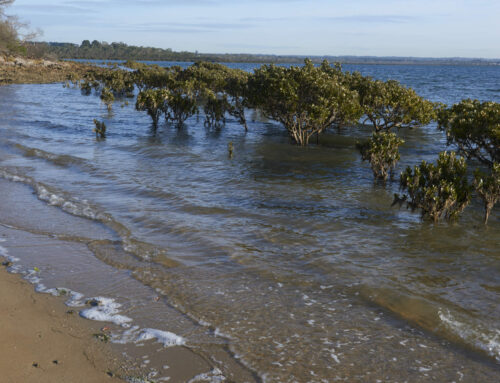A bus full of Westernport residents were determined to make their opposition known to AGL’s gas import plans. They travelled to Southbank on Wednesday, September 26th to join Environment Victoria and Friends of the Earth in protest outside the AGL Annual General Meeting at the Melbourne Recital Centre
A crowd of around a hundred people welcomed them as they arrived at the meeting to greet AGL shareholders with banners, speeches and chants of opposition and concern. As shareholders entered the Recital Centre, they were left wth no doubt about the community’s strong rejection of the proposal to permanently moor a floating storage regasification unit (FSRU) at Crib Point jetty in the protected Wetlands of Westernport Bay.
Most had made the journey to join the protest against the gas import facility, but some members of Save Westernport, with the help of Friends of the Earth Corporate initiative, Market Forces, managed to receive certificates as AGL proxy shareholders, enabling them access to the AGM itself. Once inside the meeting they were able to ask questions of AGL’s board, and voice community concerns about the safety and environmental risks of the project.
Speaking about the meeting afterwards, SaveWesternport founding member Rod Knowles said “What was so good about today was that we had all the board members (including the AGL chairman Graeme Hunt and interim CEO Brett Redman) as a captive audience right in front of us. We did our best to get our message across, and we did.”
Local resident and business woman Julia Merrington also had the opportunity to question the AGL Board. She asked “As the next Federal government will be Labour, and they have already flagged an energy Royal commission and Australian gas reserve. In the interest of managing long term sovereign risk, and protecting investors, why, is the AGL board pursuing the FSRU LNG gas ship at Crib point in Westernport? An area with a large established residential community (Crib point) very high fire danger, and a sensitive internationally recognised land and marine environment?” The chairman deflected much of her question, restating their belief that there is a gas shortage and it is purely a supply and demand issue, discounting the possibility of gas reserves as something that may or may not happen.
Julia told us afterward that “what came across clearly to me from their response is that while the forecast by AEMO predicts the Australian market has plenty of gas till 2030, AGL for whatever reason, has a gas shortage and does not have enough supply to maintain their position as a major gas player on the Australian East Coast. I don’t see why Westernport its people and environment should have to pay for AGL’s poor planning.”
The backlash from AGL shareholders about Crib Point was the dominant theme of the Q&A session. At one point, the chairman even asked shareholders to stop asking questions about Crib Point to leave time for other topics. As it turns out, the very next shareholder called upon was Dale Stohr who had doubts about AGL’s ability to guarantee downward pressure on gas prices when they’ll be importing higher-priced product from Asia at the Crib Point facility. The chairman’s frustration with the continued avalanche of well-thought-out questions was obvious, and AGL continued to deflect and restate their position rather than addressing many of the questions with any depth that reflected a considered analysis of the problems mentioned.
Other important points raised concerned AGL’s failure to consult effectively with the community, a reference to their poor advertising of public consultation sessions, and their risk to reputation. AGL board members were quizzed about recent fines awarded against the corporation, and a warning last week from the Victorian regulator for AGL “to get their house in order” or face cancellation of their retail license.
Chief executive of not-for-profit Environment Victoria, Mark Wakeham asked “if AGL cannot arrange the routine affairs of running their business, how can the public possibly put faith in their ability to manage such a complex and potentially dangerous facility?”
Due to the proposal’s location in an area protected by the international Ramsar covenant there will be complex legal and environmental conservation requirements that appear to be beyond AGL’s capabilities to fulfill.
Ideally residents would like the whole proposal to be scrapped, but the referral for the project is with the planning Minister Richard Wynne now and he will decide what happens, and whether an Environmental Effects Statement is required.
AGL has not yet released their full AGM transcript, but when they do we’ll publish relevant excerpts here.





